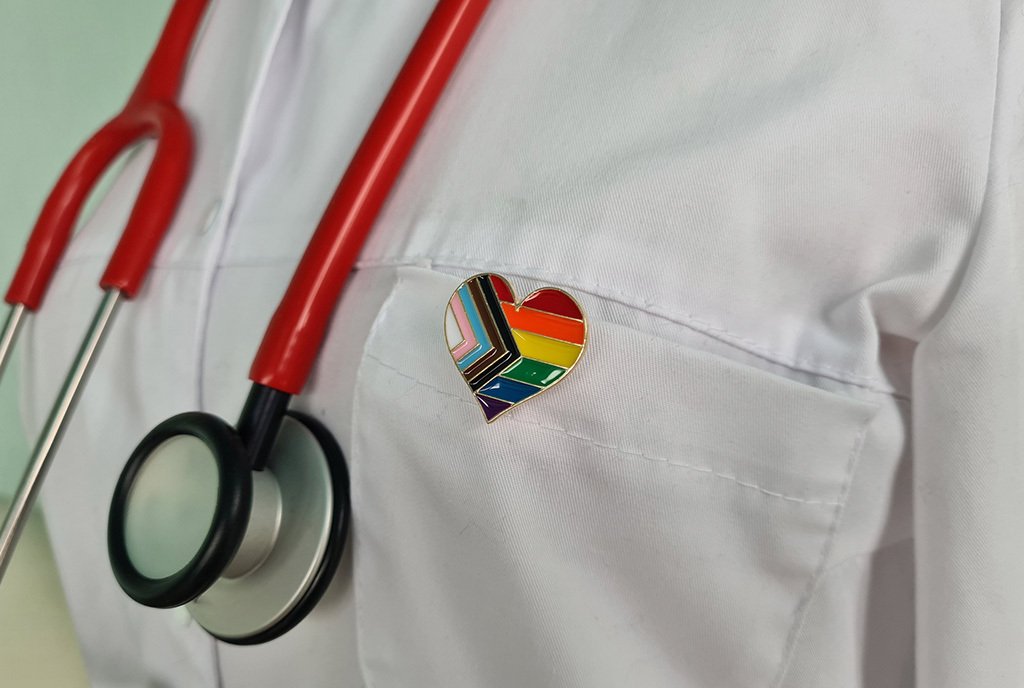
In the United States, the LGBTQ+ community has been subjected to systemic mistreatment in healthcare, from the classification of “homosexuality” as a mental disorder to bans on gay men donating blood and attacks on gender-affirming care. The pervasiveness of this discrimination and its impact on the health and wellbeing of LGBTQ+ people has cemented being heterosexual and cisgendered as a political and social determinant of health. By dismantling these structural oppressions—both in the United States and globally—we can collectively redesign healthcare, public health systems, and epistemological frameworks in health scholarship to be more just.
Embracing queer perspectives opens new pathways to rethink healthcare for vulnerable populations. By acknowledging the diverse spectrum of sexual and gender identities and expressions—including intersex, asexual, and gender nonconforming people—health justice advocates, as well as medical and public health systems, can benefit from LGBTQ+ communities’ rich and diverse experiences and expertise.
How LGBTQ+ Advocacy Can Improve Research and Healthcare Delivery
Embracing queer perspectives opens new pathways to rethink healthcare for vulnerable populations.
By challenging sex and gender binaries, interrogating traditional paradigms in health scholarship, and advocating for improved healthcare, the LGBTQ+ community is pushing healthcare systems toward equity. The following areas exemplify these important shifts:
- Destabilizing Heterosexual Cisgender Normativity
The healthcare system operates within a set of binary distinctions—such as straight and gay, male and female—which do not capture the rich diversity of human experiences nor our complex physiological and anatomical differences. Adapting health systems to better serve the LGBTQ+ community can help destabilize normative assumptions and definitions of “man” and “woman” that hurt people within and beyond the LGBTQ+ community.
According to the Lancet article “Disrupting gender norms in health systems: making the case for change,” restrictive gender norms perpetuate inequities in healthcare settings that can manifest in a multitude of ways, including only “valuing women on the basis of their reproductive capacity and provision of care for children,” “viewing men as strong and not in need of care,” and limiting “men’s engagement in maternal and pediatric care” despite evidence of the importance of their inclusion. Additionally, since gender is a spectrum and most people do not adhere to narrowly defined concepts of gender, by embracing queer perspectives, we can also better understand people living with disabilities, the elderly, or any group that is marginalized by Victorian notions of femininity and masculinity omnipresent in modern health science.
The LGBTQ+ community is pushing healthcare systems toward equity.
According to an article in Health & Social Care in the Community on queering public health, “the presumed subject of public health” is not only cisgender and heterosexual, they are also White, able-bodied, middle-class, and relatively young. Therefore, challenging gender norms can also help destabilize other widespread, normative assumptions in healthcare systems.
- Public Health and Healthcare Research and Scholarship
Research and scholarship on public health and healthcare too often neglect the experiences of LGBTQ+ people and their intersections with other marginalized identities. Queer research is not only crucial to advancing knowledge about the LGBTQ+ community, it also plays an important role in promoting social justice and informing policies that improve the health and wellbeing of all vulnerable communities.
Despite its value, health research on the LGBTQ+ community is far too scarce. A study examining National Institutes of Health (NIH)-funded research on the LGBTQ+ community between 1989 and 2011 found 628 studies, representing only about half of one percent of all NIH-funded studies during that time period. The studies’ areas of focus demonstrate disproportionate attention paid to disease, HIV/AIDS, and substance abuse. Sexual minority men were the subject of NIH studies more than six times as often as sexual minority women and more than 12 times as often as transgender populations.
Sign up for our free newsletters
Subscribe to NPQ's newsletters to have our top stories delivered directly to your inbox.
By signing up, you agree to our privacy policy and terms of use, and to receive messages from NPQ and our partners.
Another study looking at scholarship published between 2017 and 2021 found only 381 scholarly papers “that addressed the specific health needs of LGBT people, their experiences and perceptions, or nursing interventions in this population.” Given that millions of scientific publications come out each year, the amount of scholarship on the LGBTQ+ community is exceptionally low. Since research and scholarship are highly useful tools for advancing health equity, more research on this community and what circumstances and interventions are beneficial for them is urgently needed.
- Advancing Care Delivery
Since the concept of “normality” in health sets heteronormativity as the standard, people within the LGBTQ+ community, especially people who are trans, intersexed, or two-spirit, often encounter a range of discriminatory policies and practices. Discrimination and poor exchanges with care providers can affect LGBTQ+ community members by forcing them to hide their identities, perform cisgender, or not seek needed healthcare services. Care avoidance compromises healthcare access and quality; undoubtedly, care avoidance also contributes to the higher rates of communicable and noncommunicable diseases within the LGBTQ+ community.
Current research has demonstrated several strategies that have been successful in addressing stigma and building a sense of belonging within the LGBTQ+ community, that could be applied to any marginalized group. For instance, building platforms for virtual engagement that allow for relationship building and resource sharing has proven to be beneficial. Creating a safe and nonjudgemental space in which to disclose one’s sexual identity or creating queer spaces is another concept that could positively affect quality of care for the LGBTQ+ community and beyond.
While [advocates are making] important connections between health equity, healthcare delivery, and the queer community, greater commitments are needed.
The Path Ahead
Moving forward requires all of us to critically address how heterosexuality continues to operate as the privileged, universal, and “normal” sexuality, while queerness remains minoritized, particularized, and othered. In this vein, researchers and advocates are working to shift harmful narratives and champion policies that support the health, wellness, and thriving of LGBTQ+ people.
For instance, Harvard University’s Sexual Orientation and Gender Identity and Expression Health Equity Research Collaborative has ramped up its research and policy efforts in the face of threats against LGBTQ+ advocates. To inform key elements of LGBTQ+ equality, the White House has made data collection a top priority, which includes incorporating questions on sexual orientation and gender identity (SOGI) in federal surveys, creating greater uniformity among SOGI questions to maximize data comparability, and disaggregating data to shed light on often neglected subpopulations within the community.
Continuing to support the research and policy work conducted by and on behalf of the LGBTQ+ community moves us closer to achieving health equity. While organizations and individuals are working to make important connections between health equity, healthcare delivery, and the queer community, greater commitments are needed to accelerate these efforts and help the LGBTQ+ community achieve health parity with the cisgender, heterosexual population. According to Inside Philanthropy, “LGBTQ causes generally receive only $.23 out of every $100 awarded by U.S. foundations and even after marked progress in the fundraising arena, foundations still only give $.04 out of every $100 awarded to nonprofits serving transgender communities.”
Since the efforts of LGBTQ+ community leaders to create a more equitable and inclusive healthcare system will only be effective if we all support and follow their lead, it is incumbent upon all health justice advocates to work for and with queer communities.










